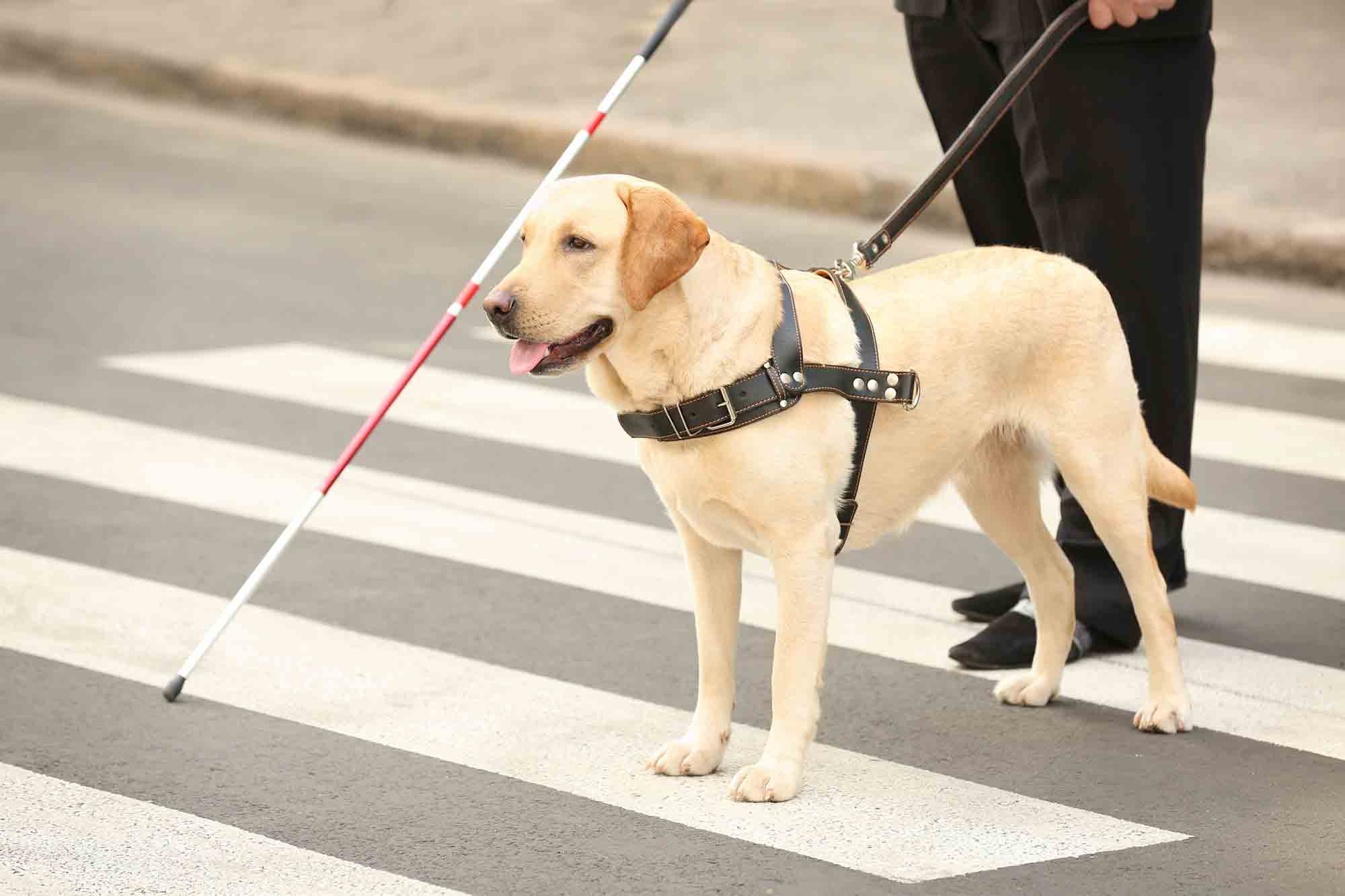What planners need to know about accommodating service animals at events
Not long ago I talked with Lisa Tucker, events coordinator with the Great Plains Americans with Disabilities Act Center, about what’s involved when you have attendees who require help from personal care assistants (PCAs) while they’re at an event. But it’s not just other humans that some people need to successfully navigate a meeting. Many individuals with disabilities use service animals to help with daily living activities like pulling a wheelchair, pushing elevator buttons, and retrieving medication or phones. Others have service animals that can help with medical issues, such as alerting them when a seizure or a psychiatric episode is about to occur. There are guide dogs and signal dogs who help those with visual and hearing impairments, sensory signal dogs who are trained to assist those who have autism, and dogs that can alert their person to the presence of an allergen.
To qualify as a service animal, the dog must be trained specifically to perform a task for the person with a disability. And yes, dogs are the only species that qualifies as an official “service animal” under Title II and III of the Americans with Disabilities Act, though miniature horses trained to perform specific tasks also should be accommodated, as long as it is practical to do so.
“A service animal is any dog that is individually trained to do work or perform tasks for the benefit of an individual with a disability, including a physical, sensory, psychiatric, intellectual, or other mental disability. Other species of animals, whether wild or domestic, trained or untrained, are not considered service animals.” — ADA Fact Sheet
As is the case with PCAs, Lisa includes a simple yes-or-no question about whether attendees plan to bring a service animal on her registration form. She says she always lets the hotel know how many of her attendees will have service animals with them so they can prepare their staff to answer questions about where to find animal relief areas, which she calls “green spaces,” either at the hotel or nearby.
“A service animal is any dog that is individually trained to do work or perform tasks for the benefit of an individual with a disability, including a physical, sensory, psychiatric, intellectual, or other mental disability. Other species of animals, whether wild or domestic, trained or untrained, are not considered service animals.”
When her meeting was held in a hotel that did not have a green space a few years ago, she said they went ahead and built one just for her meeting — a temporary fix that since has become permanent. But generally speaking, service animal handlers know the drill and don’t need a lot of accommodating from the meeting planner’s perspective. They are used to finding ways to keep their animal’s presence unobtrusive — laying quietly under a table, for example — and they know how to handle people who want to pet their animals while they’re working, which is generally a no-no. Care and feeding is the responsibility of the handler, not the meeting organizer, so don’t worry about having to add dog food to your F&B planning. Hoteliers who normally would charge an extra fee for a pet to stay with its owner are not allowed to charge extra for service animals, but they can charge the handler for any damage the animal does to the property, according to the ADA.
 “We typically have 5-15 people who have service animals at our events, and we have never had an incident of misbehavior,” she said. “We had one dog who barked once, but it wasn’t a continuous thing — it could have been an alert he was giving his owner.”
“We typically have 5-15 people who have service animals at our events, and we have never had an incident of misbehavior,” she said. “We had one dog who barked once, but it wasn’t a continuous thing — it could have been an alert he was giving his owner.”
I asked her about “comfort” animals, those emotional support dogs, cats, pythons and peacocks that keep popping up in the news as more and more of them are being carried on airplanes, causing concerns about allergies, bites, and anxiety among the non-animal lovers who have to share the plane with them. Therapy animals, however comforting, are not covered under the ADA, even if they are dogs. Again, the animal has to be specifically trained to do a task the person needs help with due to a disability, not just by their presence help with depression, anxiety or fears.
Lisa said she’s never had anyone bring an animal other than a dog to any of the Center’s events. And, while she’s heard whispers questioning whether a purported service dog at her events really was a service dog, “I wouldn’t question it as long as the animal is behaving in a service animal manner and is not disruptive.”
In fact, you are not allowed to ask for proof that an animal is a service dog, according to the ADA. There are only two questions you can legally ask:
- Is this animal required because of a disability?
- What work or task has this animal been trained to perform?
While planners and their hospitality partners are required to allow individuals with disabilities to bring their service dog to any venue where “members of the public, program participants, clients, customers, patrons, or invitees are allowed” unless there’s a legitimate safety reason not to such as a hospital surgical unit that must be kept sterile, they can ask the person to remove their animal if it isn’t housebroken or is out of the handler’s control. Even if the animal is asked to leave for good cause, it’s still on you to make sure the person can still do what they are there to do without the animal on hand.
 About Tracy Stuckrath
About Tracy Stuckrath
The Dietary Needs Expert, Top 25 Women in the Meetings Industry, Certified Special Events Professional. Tracy Stuckrath brings passion for safe and inclusive food and beverage, expertise through detailed research, and real-world strategies to help her clients establish best practices, increase profit, mitigate risk, and enhance experience with food and beverage. Reach her at 404-242-0530 or hello@thrivemeetings.com. Every Guest Matters. Every Meal Matters.



